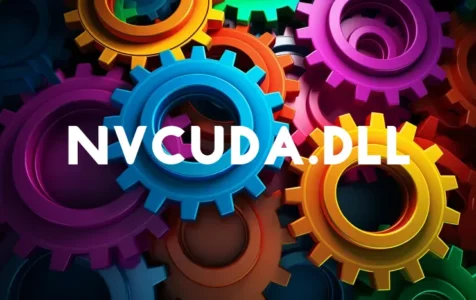Introduction to Nvcuda.dll
The file nvcuda.dll is a Dynamic Link Library associated with the NVIDIA CUDA driver. CUDA, which stands for Compute Unified Device Architecture, is a parallel computing platform and application programming interface (API) model created by NVIDIA. It allows software developers to use a CUDA-enabled graphics processing unit (GPU) for general purpose processing — an approach known as GPGPU (General-Purpose computing on Graphics Processing Units).
Functionality and Safety of Nvcuda.dll
The nvcuda.dll file is a critical component for applications that leverage the power of NVIDIA GPUs for computing tasks beyond traditional graphics rendering. This could include various simulations, complex calculations, and data analysis in scientific research, cryptocurrency mining, video processing, machine learning, and more.
When it comes to safety, the original nvcuda.dll file that is a part of legitimate NVIDIA software is completely safe to run. However, like any system file, it can be prone to being duplicated or mimicked by malicious software. Therefore, users should ensure the file is genuine and located in the appropriate system directory (commonly C:\Windows\System32).
Potential Issues with Nvcuda.dll
Errors related to nvcuda.dll can stem from various scenarios such as a corrupt installation, deletion of the file, or conflicts with other software. Some of the common warning signs are messages stating that the file is missing, faulty, or could not be loaded. These issues could potentially occur during the installation of a program, while the software reliant on the file is running, during Windows startup or shutdown, or even during the installation of the Windows operating system.
Expert Tip: For smoother PC performance, consider using a PC optimization tool. It handles junk files, incorrect settings, and harmful apps. Make sure it's right for your system, and always check the EULA and Privacy Policy.
Special offer. About Outbyte, uninstall instructions, EULA, Privacy Policy.
Resolving Issues with Nvcuda.dll
If you encounter problems with nvcuda.dll, here are some strategies to help resolve the issues:
1. Reinstalling the Driver: A straightforward fix could be to reinstall the NVIDIA drivers, which will replace the corrupt or missing nvcuda.dll file with a fresh one.
2. Manual Download and Registration of File: While some sources suggest manually downloading DLL files from websites and registering them, this approach is not recommended due to security risks and potential compatibility issues.
3. Automated Software for Fixing DLL Issues: Some third-party software claims to fix DLL-related issues by performing system scans and repairs, which might include fixing nvcuda.dll errors. These should be used with caution and proper understanding of their features and limitations.
4. Malware Scan: Performing a complete system malware scan may help if nvcuda.dll errors are caused by malicious software pretending to be the legitimate file.
5. System File Checker (SFC): Users can utilize the built-in Windows System File Checker to scan for and restore corrupted system files including the NVIDIA CUDA driver.
6. System Restore: Reverting the computer system to an earlier date when all files, including nvcuda.dll, were intact can resolve the issue.
7. Update the System: Ensuring your Windows OS is up to date can sometimes fix compatibility issues that may cause problems with DLL files.
8. Contact NVIDIA Support or Community Forums: Reaching out for support directly from NVIDIA or engaging in community-driven forums can also provide solutions to issues with nvcuda.dll.
User Experiences and Community Discussions
Many users have reported issues with nvcuda.dll in different contexts. For instance, TensorFlow users without an NVIDIA GPU encountered errors because the software attempted to load the CUDA driver which was absent. On platforms like Reddit and GitHub, some users discussed workarounds, such as disabling unnecessary warnings or using the CPU-only version of the software to bypass the need for the DLL file.
Gaming communities and users of applications like Plex have also faced issues with nvcuda.dll. The solutions varied from updating or rolling back graphics drivers to making sure the right version of the software was installed.
For Plex users, the inability to load nvcuda.dll resulted in problems playing media. They found solutions through community discussions, highlighting the value of forums in troubleshooting such issues.
In case of missing nvcuda.dll, users are commonly advised to check the installation of their graphics drivers as the first step towards resolution.
Conclusion
In summary, nvcuda.dll is an integral piece of the NVIDIA GPU ecosystem enabling applications to perform compute operations. While it is generally safe to run, users may experience issues, primarily due to missing or corrupted instances of the file. These can often be fixed by updating drivers, scanning for malware, or using Windows utilities to restore system integrity. Community forums and discussions are also invaluable resources for finding solutions to more stubborn problems related to nvcuda.dll.
